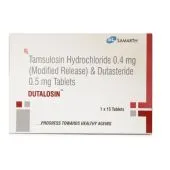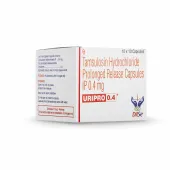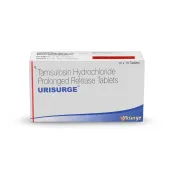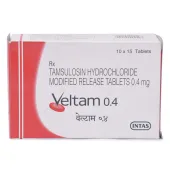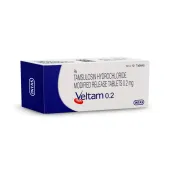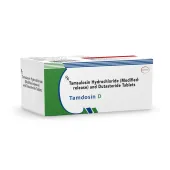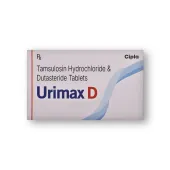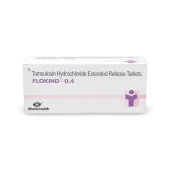Alpha Blockers

Alpha-Blockers
Men's prostate gland usually starts to enlarge once they hit 40 years of age. This condition is medically identified as benign prostatic hyperplasia (BPH). it is a natural process of aging in men and attempts to stop or reverse it so far have been unsuccessful. The prostate gland serves a fertility function as it secretes the seminal fluid which helps to nourish and transport the sperm coming from the testicles. The fluid is then stored in the seminal vesicles. The gland itself surrounds the urethra, which is the tube that carries urine from the bladder out through the tip of the penis. As the prostate grows larger, it may press on the urethra. This narrowing of the urethra can cause some men with prostate enlargement to have trouble with urination. Prostate enlargement may be the most common health problem among men above 60 years of age.
Reasons For Benign Prostatic Hyperplasia
The increase in the number of cells (hyperplasia) results in the growth of the prostate organ. The exact medical reason for this increase is still unknown. A variety of factors may be involved in this process, such as androgens (male hormones), estrogens, and growth factors and other cell signaling pathways (cell-to-cell communication).
Symptoms Of Benign Prostatic Hyperplasia, or BPH
The symptoms of BPH are often very mild at early stages, but they become more serious if they aren’t treated medically. Common symptoms include:
-
Unsuccessful bladder emptying
-
Nocturia (the need to urinate two or more times per night)
-
Dribbling at the end of your urinary stream
-
Incontinence, or leakage of urine
-
The need to strain while urinating
-
Painful urination
-
Blood in the urine
-
A sudden urge to urinate
Diagnosis
While it completely depends on your doctor and your health condition, the following are some common ways to diagnose BPH.
-
Urine flow tests
-
PSA (prostate-specific antigen) blood test.
-
Ultrasound
-
Biopsy
Preventive Measures
It is formally known that there are no ways to prevent Benign Prostatic Hyperplasia. However, you can get yourself treated at the time if you are aware of its symptoms and see a doctor at the early stage. Other than this, the following things can help you as well-
-
Urinate as soon as you feel the urge
-
Go to the bathroom to urinate, even when you don’t feel the urge
-
Avoid over-the-counter decongestants or antihistamine medications, which can make it harder for the bladder to empty
-
Avoid alcohol and caffeine, especially in the hours after dinner
-
Reduce your stress level, as nervousness can increase the frequency of urination
-
Exercise regularly, as a lack of exercise can aggravate your symptoms
-
Try Kegel exercises to strengthen your pelvic muscles
Common Medications
Several types of medications have been approved for the treatment of urinary symptoms secondary to prostate enlargement. Men with severe symptoms may require treatment with a combination of these medications.
-
Terazosin (Hytrin)
-
Prazosin (Minipress)
-
Doxazosin (Cardura)
-
Tamsulosin (Flomax)
-
Alfuzosin (Uroxatral)
-
Silodosin(Rapaflo)
-
Finasteride (Proscar)
-
Dutasteride (Avodart)
-
Tadalafil
Drug Interactions
Let your doctor know about all the drugs you're taking, especially which are listed below-
-
Aspirin
-
Fish oil
-
Paracetamol (acetaminophen)
-
Plavix (clopidogrel)
-
ProAir HFA (albuterol)
-
Spiriva (tiotropium)
-
Symbicort (budesonide / formoterol)
-
Tylenol (acetaminophen)
-
Viagra (sildenafil)
-
Vitamin B12 (cyanocobalamin)
-
Vitamin C (ascorbic acid)
-
Vitamin D3 (cholecalciferol)
Please note this is not the complete list of interactions. Visit your healthcare provider for the same.
Important Things to Know
1. You should not use Alpha Blockers if you are allergic to them. Do not fuse these drugs with similar medicines such as alfuzosin (Uroxatral), doxazosin (Cardura), prazosin (Minipress), silodosin (Rapaflo), or terazosin (Hytrin).
2. To make sure Alpha Blockers is safe for you, tell your doctor if you have:
-
liver or kidney disease;
-
a history of prostate cancer;
-
low blood pressure; or
-
an allergy to sulfa drugs.
3. Alpha-Blockers can affect your pupils during cataract surgery. Let your eye surgeon know that you are using this drug. Do not stop using Alpha Blockers before surgery unless your surgeon tells you to.
4. Although this drug is not for use in women, Alpha Blockers are not expected to harm an unborn baby. If you are a woman using this medication, tell your doctor if you are pregnant or breastfeeding.
5. Your blood pressure will need to be checked often. You will also need to be checked for prostate cancer before and during treatment with Alpha Blockers.
6. Alpha-Blockers may impair your thinking or reaction. Avoid getting up too fast from a sitting or lying position, or you may feel dizzy.
7. The level of effectiveness of alpha-blockers vary from person to person. So, it is advised not to buy Alpha-blockers online from any online drugstore, if you are not aware of its doses and reactions on your bod
Expected Side Effects
Common Alpha Blockers side effects may include:
-
Dizziness, drowsiness, weakness;
-
Nausea, diarrhea;
-
Headache, chest pain;
-
Abnormal ejaculation decreased amount of semen;
-
Back pain;
-
Blurred vision;
-
Tooth problems;
-
Fever, chills, body aches, flu symptoms;
-
Runny or stuffy nose, sinus pain, sore throat, cough;
-
Sleep problems (insomnia); or
-
Loss of interest in sex.


